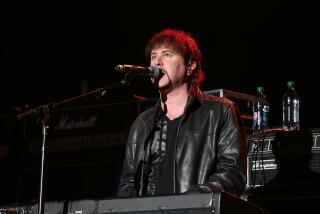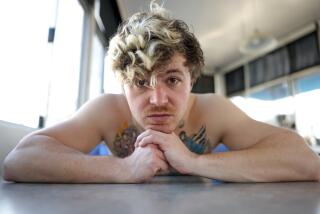Charlie Quintana, drummer for the Plugz and Social Distortion, dies at 56
Charlie “Chalo” Quintana, a fixture on the Southern California punk and roots music scene for decades, has died after struggling in recent years with emphysema and chronic obstructive pulmonary disease, or COPD, his sister Elizabeth Montoya confirmed to The Times. He was 56.
Quintana, who died Monday at his home in Cancun, Mexico, is probably best known as the drummer for a decade with long-running Orange County punk band Social Distortion, but he first came to fame as the teenage drummer for the Plugz, the groundbreaking L.A. punk group that was among the first to be started by local Latino musicians.
He had moved to Cancun about seven years ago to be near his other sister, Roxanne Quintana, Montoya said. He also had suffered from arthritis, “which made it very difficult for him to continue with the drums,” she said.
In addition to the health problems, Charlie Quintana was robbed last month and reached out for financial assistance on social media.
From his hardscrabble beginnings in L.A.’s wild and woolly punk rock scene of the late 1970s, Quintana developed a reputation as a drummer par excellence and later was tapped by Bob Dylan to be part of his touring band in the early 1990s.
“The first punk show I ever saw was the Plugz, and I was instantly blown away by Charlie’s playing,” said keyboardist Greg Kuehn, who later joined the Southern California punk group TSOL before also becoming an in-demand session and touring musician. “We wound up playing with Bob Dylan together, and became good friends, playing on a lot of sessions back in the day. He was always getting me in on stuff. Such an open-hearted guy.”
Gonzalo Quintana III was born Jan. 29, 1962, in El Paso and was recruited to come to California at age 16 by his future bandmates in the Plugz: lead singer and guitarist Tito Larriva and bassist Barry McBride.
“Tito and Barry of the Plugz along with myself drove from L.A. to El Paso to ask [his] parents … if he could move to Hollywood and stay with Barry,” musician and producer Gary Hirstius wrote Wednesday on Facebook. “His mom cried but said OK.”
In part, that was because his mother was a singer and guitarist. So when her son expressed an interest in music, she was fully supportive.
“When I lived in El Paso,” Quintana recalled in a 2007 interview, “pretty much all I wanted to do was get the hell out of El Paso.”
His rescuers happily obliged.
“We drove to L.A. and the band got to work,” Hirstius recalled. “The Plugz’ first single ‘Move/Let Go’ has a photo of Charlie on the cover in the bathroom stall in the Whisky a Go-Go dressing room…. His hair was pulled back and bell bottoms tucked into his boots. I pulled off my Triumph motorcycle T-shirt, ripped it and stuck a pin on it. We put it on Charlie.
“He took the stage and played that big-ass bass drum like I had never heard,” Hirstius wrote. “I was blown away at his talent and the power he played with. A lot of people found a favorite drummer that day. I made a new friend.”
The nascent punk scene of the late 1970s was particularly volatile, often under attack from neighbors, business owners and city officials.
“Back then, anything different was just viewed with suspicion,” Quintana told the Orange County Register in 2007. “You had to watch your back from cops, from regular people, from jocks, from rockers.”
The Plugz released two albums, “Electrify Me” in 1979 and “Better Luck” in 1981, before evolving into the Cruzados, which featured Quintana and Larriva and earned plaudits from mainstream rock musicians including Dylan, John Fogerty, David Byrne and Brian Setzer, among others.
Despite the heavyweight acclaim, the Cruzados never connected commercially in a big way and by 1990 had disbanded, at which time Quintana joined the Havalinas, an acoustic-minded punk-roots-rock group formed by ex-Levi & the Rockats guitarist Tim Scott McConnell and bassist Stephen Dennis “Smutty Smiff” Smith.
“There is such a thing as magic,” McConnell posted Wednesday on Quintana’s Facebook page. “Charlie was that. His playing could bring you to thankful tears just to be making music with him. We were kindred musical souls, but I will miss his knowing smile even more than his drumming.”
Quintana’s history backing Dylan on tour lured the venerated singer-songwriter to check out the Havalinas.
“We were doing a date at the Roxy, and [Dylan] came down and saw the show,” McConnell told The Times in 1990. “He came backstage after the show and said hello [because] Charlie had played with him a few years ago. The next day, we got a call [from Dylan’s management] with an offer to tour.”
Of one Havalinas performance, pop music journalist Jim Washburn wrote for The Times, “Rampaging over their songs, the three often played like an antic cross between the Stray Cats and the Violent Femmes.
“Though McConnell and Smith both played acoustic instruments, they did so with a volume and drive that sank thoroughly into the grooves and grunge of their music,” Washburn wrote. “And Quintana was one involved drummer, playing with a firecracker intensity throughout the evening.”
Following his stint with the Havalinas, Quintana moved on in 1992 to join Guns N’ Roses founding member Izzy Stradlin in his new blues-rock band, the Ju Ju Hounds, which lasted about two years.
It wasn’t a big leap for Quintana to move from punk to working with a hard rock guitar hero, given that he often cited Led Zeppelin, Deep Purple and Cheap Trick among his primary musical influences growing up in Texas.
A few years later, he got the call from Social Distortion founder, lead singer and songwriter Mike Ness to join that group.
“I remember listening to Social D before they were played on the radio,” Quintana told the Albuquerque Journal in 2007. “Everything that I bought was from record stores that sold underground music…. This was a band that I grew up with and always wanted to be a part of, and here I am performing night after night.”
Beyond anchoring the veteran punk group’s rhythm section, he also contributed creatively.
“A lot of people think that it’s just Mike’s band,” he said, “but we all have a voice in the music.”
Two years later he decided to leave Social Distortion, at which point he said, “Playing with Social D for ten years was a good time in my life. I was lucky to play on two Social D albums and the second [Mike Ness] solo album, and I am proud to have been a part of the band.”
Two decades into his career, he said he felt he was continuing to improve as a musician.
“I think you really get to know your instrument when you’re a bit older,” he said. “You mature hopefully personally but musically as well.”
Billy Zoom, guitarist for long-running L.A. punk band X, posted Friday on Facebook: “The loss of a friend is a heartbreak…. The loss of such a good drummer is a tragedy of unfathomable proportions. Goodbye Charlie.”
Besides his mother and sisters, Quintana is survived by his his daughter, Christine Elizabeth Quintana, and brother-in-law Arthur Montoya.
Elizabeth Montoya said a memorial service is being arranged in El Paso once his body is returned to the family. That task is the subject of a GoFundMe campaign to raise the money for the transportation and service expenses. As of Saturday, more than $8,000 had been raised.
Montoya also said her sister is organizing a memorial for Quintana’s community of friends in Cancun for Sunday.
Follow @RandyLewis2 on Twitter.com
For Classic Rock coverage, join us on Facebook
More to Read
The biggest entertainment stories
Get our big stories about Hollywood, film, television, music, arts, culture and more right in your inbox as soon as they publish.
You may occasionally receive promotional content from the Los Angeles Times.






